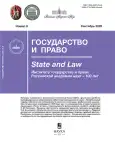CONSTITUTIONAL INNOVATIONS 2020: TWO OF THEIR IMPERFECTIONS IN THE FIELD OF JUSTICE MECHANISM
- Authors: Kleandrov M.I.1
-
Affiliations:
- Institute of State and Law of the Russian Academy of Sciences
- Issue: No 9 (2025)
- Pages: 35-45
- Section: Court, prosecutor’s office, bar, notarial system
- URL: https://bakhtiniada.ru/1026-9452/article/view/318307
- DOI: https://doi.org/10.31857/S1026945225090038
- ID: 318307
Cite item
Abstract
Based on the analysis of two additions introduced in 2020 to the Constitution of the Russian Federation, the article substantiates the conclusion about serious imperfections (it was not possible to find another word) of two links in the modern organizational and legal mechanism of justice. The first follows from the text of Part 3 of Art. 118 of the Constitution of the Russian Federation, which lists the courts that make up the judicial system of the Russian Federation, and where there are no military courts, which can be explained by their attribution by three federal constitutional laws to courts of general jurisdiction. However, this text names arbitration courts, which, together, like the military courts, make up two autonomous multi-layer specialized judicial systems, closing into the corresponding judicial collegia of the Supreme Court of the Russian Federation; they even have about the same number of judicial bodies – about a hundred. It turns out that Part 3 of Art. 118 of the Constitution of the Russian Federation “went” after the three named federal constitutional laws, but it should be the other way around: military courts should also be present in this constitutional innovation, after which and in accordance with which these federal constitutional laws are subject to adequate adjustment. The second follows from the texts of paragraph “e.3” of Art. 83 and paragraph “l” part 1 of Art. 102 of the Constitution of the Russian Federation, according to which the Federation Council, on the proposal of the President of the Russian Federation, terminates the powers of the heads and judges of the Constitutional and Supreme Courts of the Russian Federation, as well as cassation and appeal courts in case of gross misconduct. It is concluded that this has destroyed the unity of the status of judges, since here comes the constitutional responsibility of judges, while for the same violation the rest of the judiciary comes disciplinary responsibility.
About the authors
M. I. Kleandrov
Institute of State and Law of the Russian Academy of Sciences
Author for correspondence.
Email: mklean@igpran.ru
10 Znamenka str., 119019 Moscow, Russia
References
- Vinogradova E. V. The facets of modern Russian constitutionalism. M., 2021. P. 12 (in Russ.).
- Vinogradova E. V., Vinogradova P. A. Strengthening constitutional guarantees by amendments to the Constitution of the Russian Federation. M., 2020. Pp. 111, 125 (in Russ.).
- Kleandrov M. I. In defense of the constitutional (statutory) courts of the subjects of the Russian Federation // Russ. Justice. 2015. No. 6. Pp. 2–7 (in Russ.).
- Kleandrov M. I. Constitutional responsibility of a judge – the case of the day after tomorrow? // Journal of Constitutional Justice. 2012. No. 2 (26). Pp. 1–8 (in Russ.).
- Kleandrov M. I. Constitutional (statutory) courts of the subjects of the Russian Federation or constitutional (statutory) councils: should these courts have been abolished? // Judge. 2023. No. 10. Pp. 40–45 (in Russ.).
- Kleandrov M. I. Mechanism of ethical responsibility of a judge: problems of formation. M., 2017 (in Russ.).
- Kleandrov M. I. Responsibility of a judge. M., 2011 (in Russ.).
- Kleandrov M. I. Problems of judicial power and academic science // Herald of the Russian Academy of Sciences. 2014. Vol. 84. No. 9. Pp. 810–816 (in Russ.).
- Kleandrov M. I. Status of a judge: legal and related components. M., 2008 (in Russ.).
- Kleandrov M. I. Status of a judge: textbook. Novosibirsk, 2000 (in Russ.).
- Kolosov N. M. Constitutional responsibility is an independent type of legal responsibility // State and Law. 1997. No. 2. P. 90 (in Russ.).
- Lipinsky D. A., Musatkina A. A. On sanctions of constitutional responsibility and protection measures // Constitutional and Municipal Law. 2014. No. 12. Pp. 15–18 (in Russ.).
- The Message of the President of the Russian Federation to the Federal Assembly of the Russian Federation (On the situation in the country and the main directions of domestic and foreign policy of the state). M., 2020 (sep. edition). Pp. 43, 44 (in Russ.).
Supplementary files










